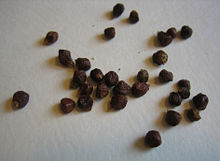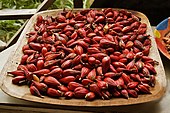Aframomum melegueta
From Wikipedia, the free encyclopedia
- For the similarly named Luso-Brazilian chili pepper, see Malagueta pepper.
| Aframomum melegueta grains of paradise | |
|---|---|
 | |
| Scientific classification | |
| Kingdom: | Plantae |
| (unranked): | Angiosperms |
| (unranked): | Monocots |
| (unranked): | Commelinids |
| Order: | Zingiberales |
| Family: | Zingiberaceae |
| Genus: | Aframomum |
| Species: | A. melegueta |
| Binomial name | |
| Aframomum melegueta K. Schum. | |
Aframomum melegueta is a species in the ginger family, Zingiberaceae. This spice, commonly known as grains of paradise, melegueta pepper,alligator pepper, Guinea grains, fom wisa, or Guinea pepper, is obtained from the ground seeds; it gives a pungent, peppery flavour with hints of citrus.
Although it is native to West Africa, it is also an important cash crop in the Basketo district (Basketo special woreda) of southern Ethiopia.[1]
Contents[hide] |
[edit]Characteristics
A. melegueta is a herbaceous perennial plant native to swampy habitats along the West African coast. Its trumpet-shaped, purple flowers develop into 5 to 7 cm long pods containing numerous small, reddish-brown seeds.
The pungent, peppery taste of the seeds is caused by aromatic ketones; e.g., (6)-paradol (systematic name: 1-(4-hydroxy-3-methoxyphenyl)-decan-3-one). Essential oils, which are the dominating flavor components in the closely related cardamom,[2] occur only in traces.
[edit]Uses
Melegueta is commonly employed in the cuisines of West and North Africa, where it has been traditionally imported via caravan routes through the Sahara desert, and whence they were distributed to Sicily and Italy. Mentioned byPliny as "African pepper" but subsequently forgotten in Europe, they were renamed "grains of paradise" and became a popular substitute for black pepper in Europe in the 14th- and 15th-centuries.[3][4][5] The Ménagier de Parisrecommends it for improving wine that "smells stale". Through the Middle Ages and into the Early Modern period, the theory of the Four Humours governed theorizing about nourishment on the part of doctors, herbalists and druggists: in this context, John Russell characterized Grains of Paradise, in The Boke of Nurture as hot and moist.[6]
In 1469, King Afonso V of Portugal granted the monopoly of trade in the Gulf of Guinea to Lisbon merchant Fernão Gomes,[7] including the exclusive trade ofAframomum melegueta, then called "malagueta" pepper - which was granted by 100 000 real-annually in exchange for exploring 100 miles of the coast of Africa a year for five years.[8] After Christopher Columbus reached the New World in 1492 and brought the first samples of Capsicum frutescens, the name malagueta was then taken to the new chilli "pepper".[4]
The importance of the spice is shown by the designation of the area from the St Johns River (present day Buchanan) to Harper in Liberia as the "Grain Coast" in honor of the availability of grains of paradise.[9] Later, the craze for the spice waned, and its uses were reduced to a flavoring for sausages and beer. In the eighteenth century, its importation to Great Britain collapsed after a Parliamentary act of George III forbade its use in malt liquor, aqua vita and cordials.[10] In 1855, England imported about 15,000 to 19,000 lbs per year legally (duty paid).[9] By 1880, the Encyclopaedia Britannica (9th edition) was reporting, "Grains of paradise are to some extent used in veterinary practice but for the most part illegally to give a fictitious strength to malt liquors, gin and cordials".[11]
The presence of the seeds in the diets of lowland gorillas seems to have some sort of medicinal properties for their cardiovascular health in the wild. As captive lowland gorillas haven't had them usually available in their diets, it could be a cause of their occasionally poor cardiovascular health in zoos.[12]
Today, it is largely unknown outside of West and North Africa, except for its use as a flavoring in some beers (including Samuel Adams Summer Ale), gins, and Norwegian akvavit.[13] In America, grains of paradise are starting to enjoy a slight resurgence in popularity due to their use by some well-known chefs. Alton Brown is a fan of its use, and he uses it in okra stew, and also his apple pie recipe on an episode[14] of the TV cooking show Good Eats. They are also used by people on certain diets, such as a raw food diet, because they are less irritating to digestion than black pepper.
[edit]Properties
In West African folk medicine, grains of paradise are valued for their warming and digestive properties, and among the Efik people in Nigeria have been used for divination and ordeals determining guilt.[15] A. melegueta has been introduced to the Caribbean Islands, where it is used as medicine and for religious (voodoo) rites.[citation needed]

No comments:
Post a Comment